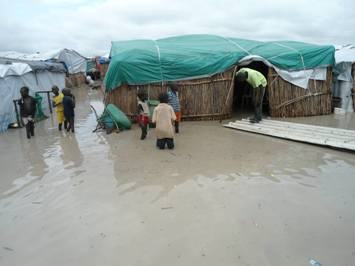Thousands displaced by heavy flooding in S. Sudan’s Unity state
September 15, 2014 (KAMPALA) – Heavy flooding in Unity state’s Payinjiar county has destroyed crops and displaced hundreds, according to Simon Kuol Beliew the secretary of the South Sudan Relief and Rehabilitation Commission (SSRC).

Beliew described the situation in Nyal payam as dire, saying a huge number of civilians were suffering from severe cases of malaria and other waterborne diseases.
In an interview with Sudan Tribune by satellite phone, he called on aids agencies to take urgent measures to help hundreds of people facing food insecurity as a result of ongoing flooding in the area.
He said most farms had already been inundated, describing the situation on the ground as life threatening”, particularly for vulnerable women and children.
“We therefore call for immediate humanitarian organisations to flow in for their support,” said Beliew.
Catholic relief organisation Sign of Hope is the only international organisation still operating in the area after the country erupted in violence in mid-December last year.
It is providing medical care through its two health facilities, which service nearly 40,000 of people in the Nyal area.
Speaking to Sudan Tribune on Monday, Michael Kuany Bol, a camp manager working with Sign of Hope in Nyal, expressed concern over the outbreak of malaria.
In July alone some 1,174 patients were diagnosed with the disease, with two people reported to have died.
However, Bol says the organisation’s efforts to raise awareness about the disease and encourage the use of mosquito nets has helped reduce the number of patients to less than 900 for the month of August.
“Yes, last month the number of patients has reduced from [one] thousand plus to hundreds due to our recommendation to family members to uses mosquitoes nets for the prevention of [the] deadly disease,” he said.
Payinjiar county is situated in South Sudan’s low lands, making it easy for the Nile water to run down and inundate of flat areas. The area experiences heavy, reoccurring flooding every year.
Over 50,000 people in the area were affected by food insecurity due to last year’s flooding and the humanitarian situation has continued to worsen since political differences between forces loyal to president Salva Kiir and his former deputy, Riek Machar, erupted in violence, triggering tribal tensions across the country.
Thousands have died in the conflict, with more than 1.5 million displaced from their homes, including hundreds of thousands who have fled to neighbouring countries.
(ST)
